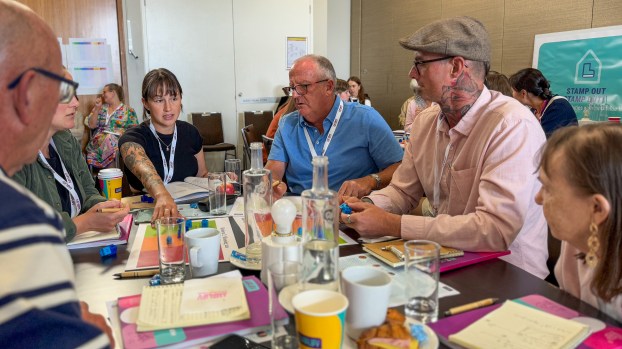There is overwhelming support for bold action on housing reform in Australia, a community forum has revealed.
Organised by Amplify – a non-partisan community-led organisation slash think tank – an event was held in Sydney in February during which ordinary Australians discussed the country’s housing crisis.
“We had 100 Australians from all walks of life from across the country. Every generation represented; every part of Australia represented – it was a microcosm of Australia,” Georgina Harrisson, Amplify CEO tells GN.

During the two-day event, the group was presented with 13 housing policies to debate and choose from. “People came in with all their lived experience of the housing system and the housing market and we saw them use that to inform their discussions. But, ultimately, land on solutions that were best for the community as a whole,” Harrisson says.
The top five polices chosen in ranking order were – number one – reforms to unlock modular buildings. “There was a strong signal from the community that we need to build more houses,” Harrison says. “The community really leant into this because it is a practical step to something that could really unlock supply at a faster pace than we see today.”
The second most popular policy: allowing more homes to be built where people want to live near transport links.
Third, reforming renters’ rights. “There was a consensus in the room that we needed to see greater protections for renters so that they have a place to really call home,” Harrisson says.
Fourth, a 10 per cent increase in affordable housing by 2045. And fifth, relaxing regulations to make it easier to build granny flats, tiny homes or convert garages.

Harrisson tells GN the forum showed that community is open and willing to accept trade-offs to tackle the housing crisis. “The community is willing to accept higher density. The community is open to having building regulations changed to enable innovation in the building sector. The community is open to having a conversation about the balance of renters’ rights in the rental market.”
The outcomes will shape a national advocacy campaign calling on policymakers to take action. “To say, when the community takes a look at these issues, this is where they land,” Harrison says. “There is strong support for a wide range of reforms, but here are five where you can absolutely say that – no matter your voting preference, no matter your age – there is support in the community to do these reforms and to do them well.”
You have to have a constituency for reform
But will the policymakers listen? Harrisson – who has worked as a high-level public servant in both the UK and NSW governments – is optimistic. “There is an appetite in government to find new advocates and new voices that support reforms when they represent the community as a whole,” she tells GN. “These are not people who are traditional advocates for housing. These are 100 Australians off the street who have come together, learned together, debated together and come up with these solutions – I think that’s a pretty compelling message for decision makers.”
Harrisson says the community is cognizant that the scale and pace of ambition needed to resolve the housing crisis has been far too small and far too slow. “On housing we have seen median house prices go so far out of reach for median income earners that it feels like the problem has been growing without the level of action that is needed for a long period of time,” she says.
Harrisson tells GN that when you have a generation facing being worse off than the previous one, something has to give. “The social compact is being torn apart here by the housing crisis,” she says. “Unless we can find a way to really address that, we put broader societal issues at risk.”
The forum gives some reason for hope. It showed people are highly motivated to meet the challenge and fix the crisis, says Harrisson. “And if you want to see reform happen you have to have a constituency for that reform. What we’re trying to do here at Amplify is build those constituencies for those big decisions, those big ideas that government need to make to make those bold steps a little bit easier.”




Leave a Reply